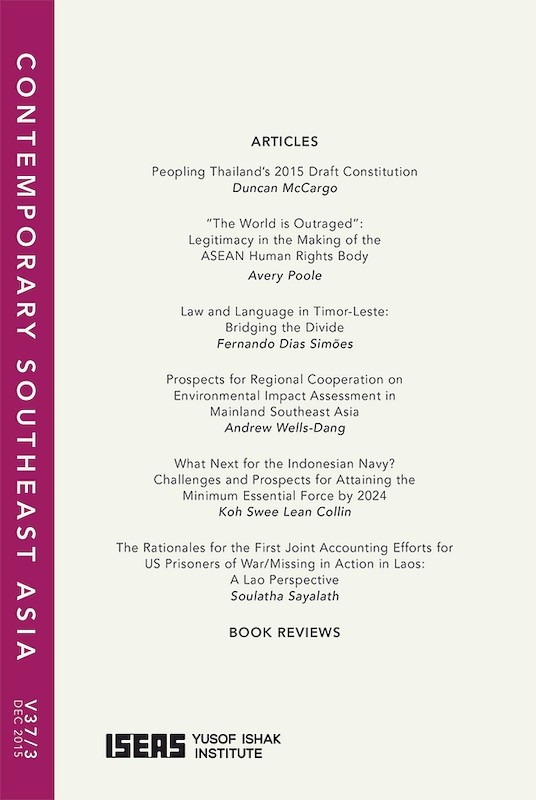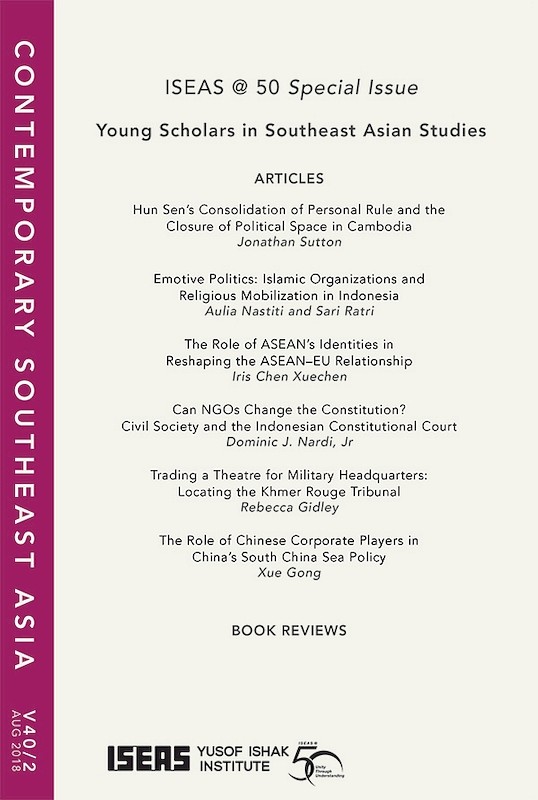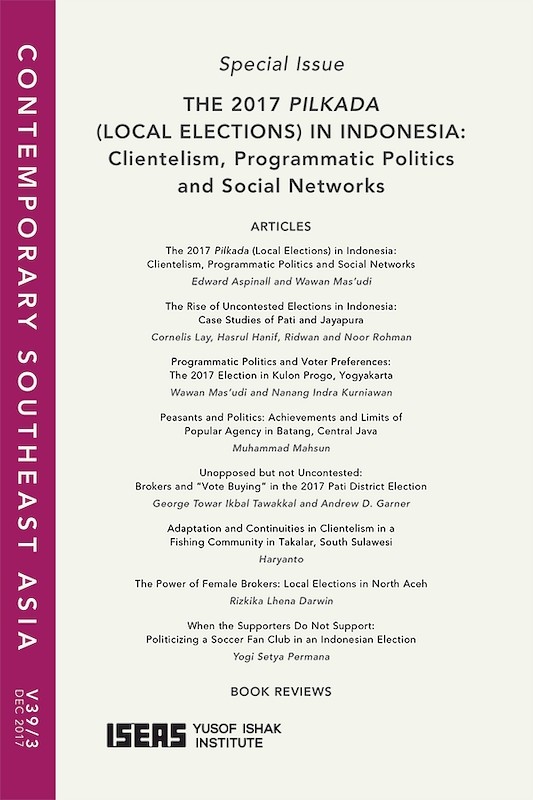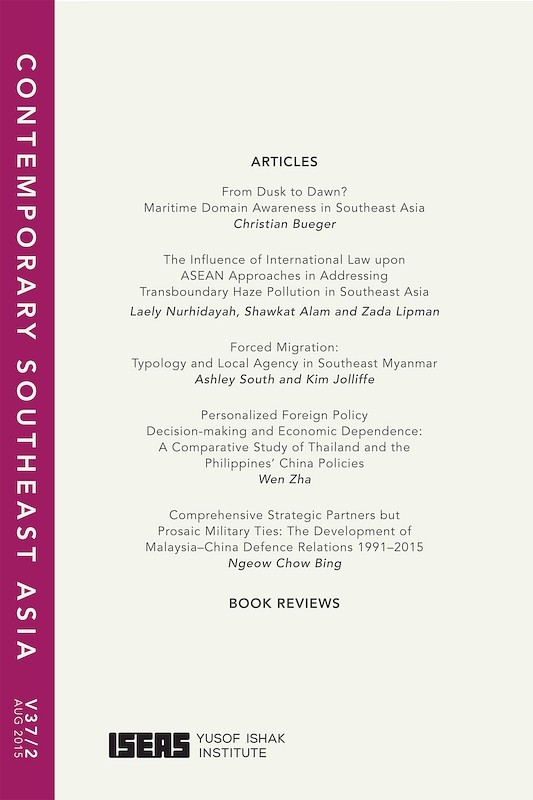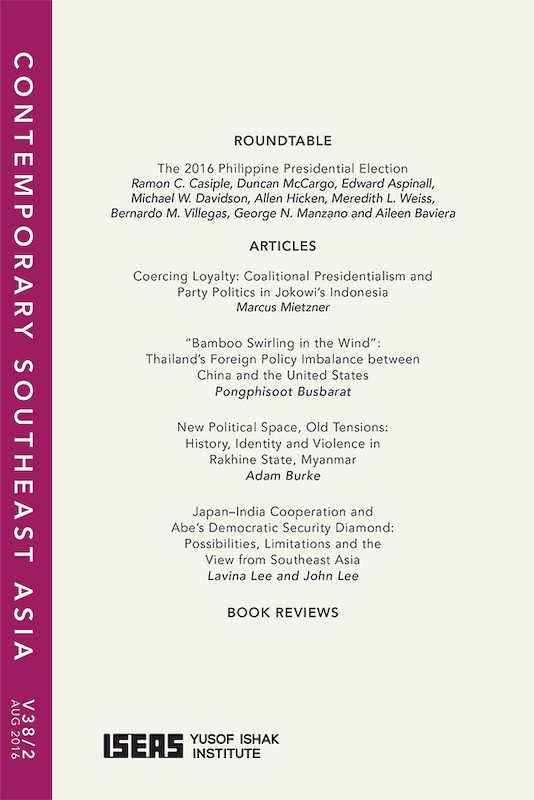Contemporary Southeast Asia Vol. 41/3 (December 2019)
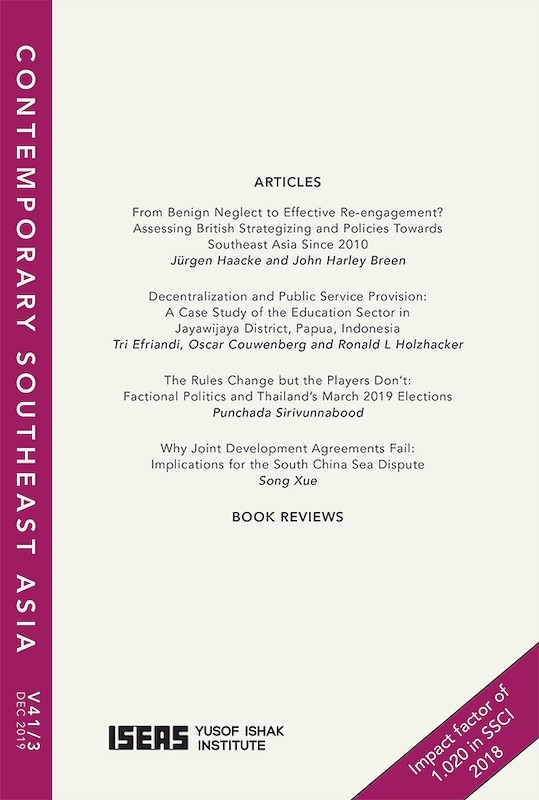
Ian Storey, editor
Date of publication:
December 2019
Publisher:
ISEAS – Yusof Ishak Institute
Number of pages:
140
Code:
CS41/3
About the publication
- Attained impact factor of 1.020 in Social Sciences Citation Index 2018
- Ranked 18th by Google Scholar Metrics 2018 in the Asian Studies and History category
Contents
-
Contemporary Southeast Asia Vol. 41/3 (December 2019)
[Whole Publication, ISSN: 1793284X] -
Preliminary pages
- ARTICLES
-
1. From Benign Neglect to Effective Re-engagement? Assessing British Strategizing and Policies Towards Southeast Asia Since 2010, by Jürgen Haacke, John Harley Breen, authors see abstractAgainst the backdrop of debates about the UK’s ability to design and implement grand strategy or effective regional strategies, this article examines the nature, coherence and effectiveness of Britain’s recent re-engagement with Southeast Asia. The article makes three main arguments. First, British re-engagement vis-à-vis Southeast Asia has been multi-dimensional in character with an emphasis on defence and economic diplomacy, alongside efforts to achieve a separate new dialogue partnership with ASEAN. Second, the recent notable increase in the Royal Navy’s presence in Southeast Asia and the surrounding region not only reflects the “Global Britain” narrative of Conservative Party policymakers, but also builds on more longstanding security and alliance considerations and institutional support that preceded the June 2016 Brexit referendum. Third, while British strategizing and policies may in the longer term yield the outcomes the UK wants, the effectiveness of the country’s re-engagement for now is to some extent in question. In particular, UK policymakers and officials continue to struggle in taking forward and convincingly communicating an integrated and aligned strategy vis-à-vis Southeast Asia that is embedded in a wider regional approach.
-
2. Decentralization and Public Service Provision: A Case Study of the Education Sector in Jayawijaya District, Papua, Indonesia, by Tri Efriandi, Oscar Couwenberg, Ronald L Holzhacker, authors see abstractFor decades, Indonesia’s sovereignty over Papua has been contested, resulting in violent conflicts. In 2001, the introduction of Papua’s special autonomy emerged as an integrative approach both to resolve conflicts and to accelerate development in the province. One of the key problems to be addressed was the improvement of the education sector. However, after more than a decade following its implementation, and despite increased financial support from the central government, the educational development in Papua has been disappointing. This article analyses the factors that have shaped the development of primary education in Jayawijaya, a highland district in Papua. By gathering qualitative data from policy studies and in-depth interviews, this article identifies and examines three major challenges that have affected the development of primary education in Jayawijaya after decentralization: the uniformity of policy, the problem with incentives, and poor monitoring due to the misalignment of territorial and functional structures. These findings demonstrate that the lack of awareness to recognize the variety of local contexts is counterproductive and could lead to policy failures. Papua’s special autonomy as an instrument of asymmetric decentralization has been attenuated by the continuation of “one-size-fits-all” top-down policies at the national level.
-
3. The Rules Change but the Players Don’t: Factional Politics and Thailand’s March 2019 Elections, by Punchada Sirivunnabood, author see abstractThailand’s March 2019 elections were the first polls to be held after five years of direct military rule under General Prayut Chan-ocha. Although the 2017 Constitution introduced many new provisions which aimed to change the country’s political landscape, especially the political party system, its impacts appear limited as the 2019 electoral outcomes suggest that party politics in Thailand continue to involve the same set of players. Old-style factional politics have survived, particularly in the military-backed Palang Pracharat party, which houses multiple factions, including defectors from Pheu Thai. Focusing on the relationship between Palang Pracharat and its factions, this article argues that the 2017 Constitution failed to achieve many of its goals. Internal party politics within Palang Pracharat resemble those of past political parties, wherein factions prevail and sharp infighting over cabinet seats continue.
-
4. Why Joint Development Agreements Fail: Implications for the South China Sea Dispute, by Song Xue, author see abstractAlthough nearly twenty joint development agreements have been signed since the 1950s, only a few have been implemented and even fewer have achieved successful commercialization. This article discusses the conditions leading to the implementation failures of joint development agreements. Applying the Crisp-set Qualitative Comparative Analysis method to nineteen joint development agreements between 1958 and 2008, this article argues that the only causally-related condition associated with the failed implementation of joint development agreements is the deterioration of bilateral relations, often arising from the maritime boundary dispute that the joint development agreement was supposed to resolve. Other possible hypotheses, such as lack of economic incentives, energy independence, domestic opposition, third-party intervention and disagreements over the details of the project, do not show any correlated pattern with the failure to implement such agreements. The finding provides policy implications for the current boundary disputes in the South China Sea: improved bilateral relations is the prerequisite for the effective implementation of joint development ventures, and not the other way around. Littoral states should also not pursue joint development agreements as a false pretext to secretly consolidate their maritime boundary claims, or to confirm the status of a “dispute”. Furthermore, successful negotiations for a Code of Conduct for the South China Sea may help to create a conducive atmosphere for claimant states to agree on the joint development of offshore hydrocarbon resources.
- BOOK REVIEWS
-
BOOK REVIEW: Democracy for Sale: Elections, Clientelism and the State in Indonesia, by Edward Aspinall and Ward Berenschot, by Siwage Dharma Negara, author
-
BOOK REVIEW: Asia’s Regional Architecture: Alliances and Institutions in the Pacific Century, by Andrew Yeo, by William Tow, author
-
BOOK REVIEW: Aristocracy of Armed Talent: The Military Elite in Singapore, by Samuel Ling Wei Chan, by John Bradford, author
-
BOOK REVIEW: Speaking Out in Vietnam: Public Political Criticism in a Communist Party-Ruled Nation, by Benedict J. Tria Kerkvliet, by Thaveeporn Vasavakul, author
-
BOOK REVIEW: China’s Asia: Triangular Dynamics since the Cold War, by Lowell Dittmer, by Huong Le Thu, author
-
BOOK REVIEW: ASEAN’s Half Century: A Political History of the Association of Southeast Asian Nations, by Donald E. Weatherbee, by Shaun Narine, author


